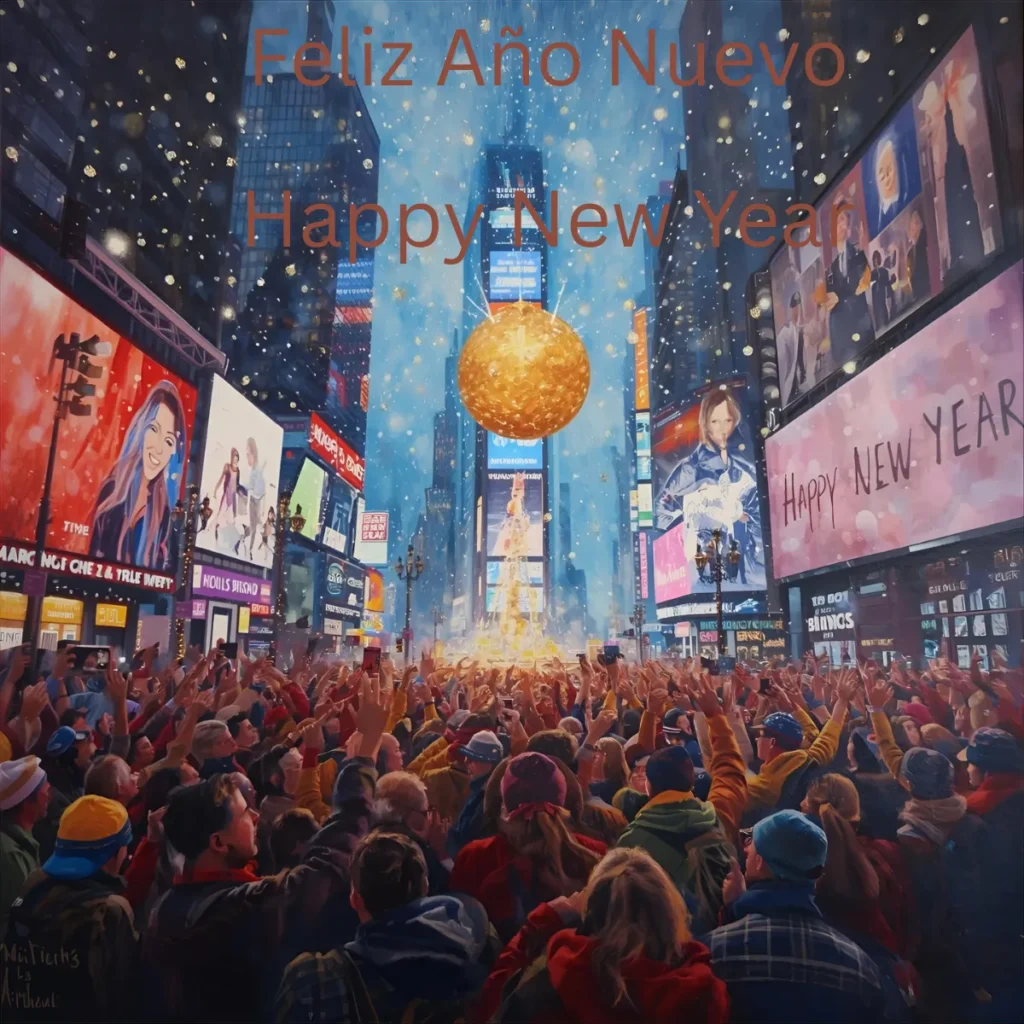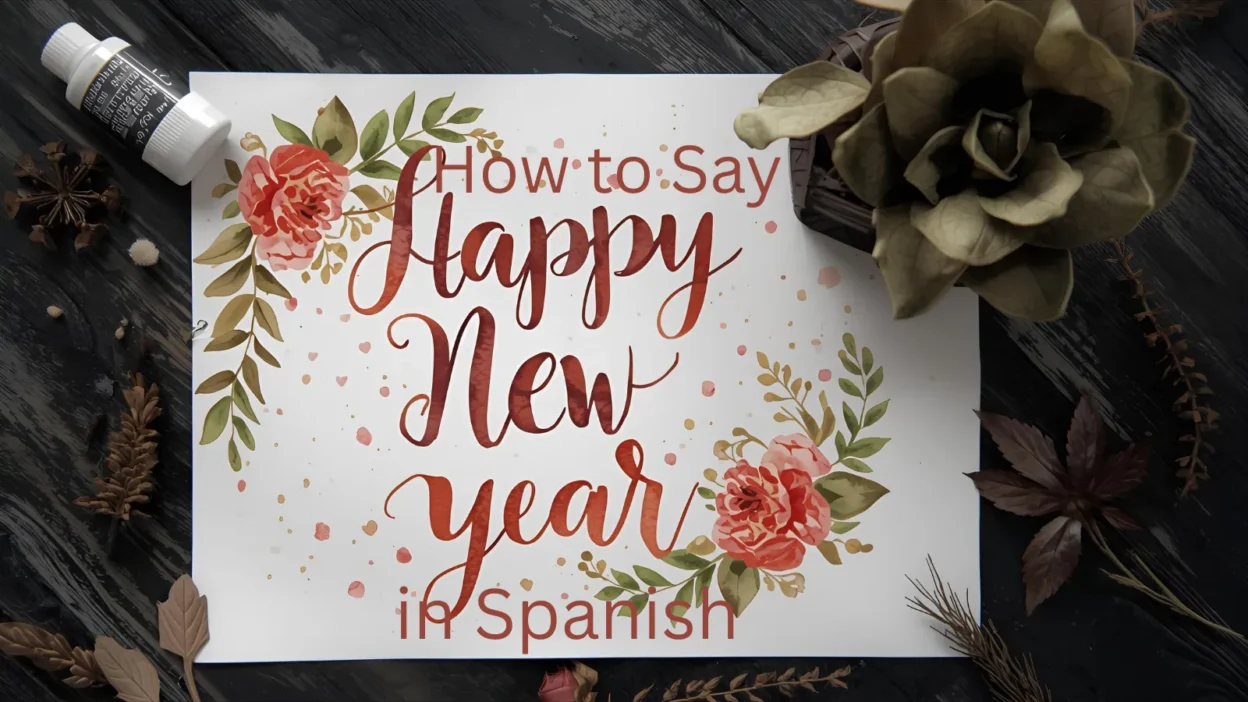If you want to wish someone a joyful start to the year, learning how to say Happy New Year in Spanish is a great idea. The most common phrase is “Feliz Año Nuevo,” and it’s used in many Spanish-speaking countries. Whether you are texting a friend, writing a greeting card, or celebrating in person, this phrase helps you sound warm and friendly. It’s simple to say, easy to remember, and perfect for New Year celebrations.
And when you use it with a smile, it spreads positive energy. Let’s explore how to use it naturally and sound confident.
Say Happy New Year in Spanish
Here are 15 ways to greet the New Year en español—with real dialogue examples and cultural context for each.
15 Phrases to Say Happy New Year in Spanish
| # | Spanish Phrase | English Meaning |
|---|---|---|
| 1 | Feliz Año Nuevo | Happy New Year |
| 2 | Próspero Año Nuevo | Prosperous New Year |
| 3 | Que tengas un feliz año nuevo | May you have a happy new year |
| 4 | Mis mejores deseos para el Año Nuevo | My best wishes for the New Year |
| 5 | Que este año nuevo te traiga alegría | May this New Year bring you joy |
| 6 | Salud, amor y prosperidad en el Año Nuevo | Health, love, and prosperity in the New Year |
| 7 | Feliz Año Nuevo a todos | Happy New Year to all |
| 8 | Que tus sueños se hagan realidad este año | May your dreams come true this year |
| 9 | Te deseo un año lleno de bendiciones | I wish you a year full of blessings |
| 10 | Que tengas un año nuevo maravilloso | Have a wonderful New Year |
| 11 | Feliz Año Nuevo lleno de éxitos | Happy New Year full of success |
| 12 | Que el Año Nuevo te sonría | May the New Year smile upon you |
| 13 | Brindemos por el Año Nuevo | Let’s toast to the New Year |
| 14 | Un nuevo comienzo, un nuevo año | A new beginning, a new year |
| 15 | Mucha felicidad en este Año Nuevo | Much happiness in this New Year |
1. ¡Feliz Año Nuevo! – Happy New Year!

Origin:
This is the most direct and universally recognized way to say “Happy New Year” in Spanish-speaking countries.
Example:
👤 User A: ¡Feliz Año Nuevo, María!
👤 User B: ¡Gracias! Igualmente, que tengas un año increíble.
Use: Standard and formal; works in any country and context.
2. ¡Próspero Año Nuevo! – Prosperous New Year!
Origin:
This version emphasizes wishing wealth and success in the coming year—often seen on greeting cards and formal messages.
Example:
👤 User A: ¡Próspero Año Nuevo, Don Jorge!
👤 User B: ¡Muchas gracias, igualmente!
Use: Formal; often used in business or elder respect situations.
3. ¡Feliz 2025! – Happy 2025!

Origin:
Simply swapping in the year is a common modern twist. It adds specificity and is popular in New Year’s posts and messages.
Example:
👤 User A: ¡Feliz 2025! ¿Listo para nuevos comienzos?
👤 User B: ¡Sí! Este año será nuestro.
Use: Casual to festive; good for messages and social media.
4. ¡Felicidades por el Año Nuevo! – Congratulations on the New Year!
Origin:
“Felicidades” (congratulations) is commonly used in Spanish for both birthdays and holidays.
Example:
👤 User A: ¡Felicidades por el Año Nuevo!
👤 User B: ¡Gracias! Lo mismo para ti.
Use: Formal or heartfelt; often used in Latin American countries.
5. ¡Que tengas un feliz año! – Wishing you a happy year!

Origin:
A more personal version, often used in speech and writing to express sincere wishes.
Example:
👤 User A: ¡Que tengas un feliz año, amigo!
👤 User B: ¡Tú también, cuídate mucho!
Use: Friendly and warm.
6. ¡Que el año nuevo te traiga felicidad! – May the new year bring you happiness!
Origin:
A blessing-style greeting, common in written messages or cards.
Example:
👤 User A: ¡Que el año nuevo te traiga felicidad y salud!
👤 User B: ¡Amén! Lo mismo para ti.
Use: Sincere and emotional; common in family contexts.
7. ¡Feliz entrada de año! – Happy New Year’s Eve!
Origin:
Used in Spain especially, this refers to the moment of “entering” the new year on December 31st.
Example:
👤 User A: ¡Feliz entrada de año!
👤 User B: ¡Gracias! Que lo pases genial esta noche.
Use: Regional (Spain); for December 31st celebrations.
8. ¡Feliz Año! – Happy Year!
Origin:
A shortened version of “Feliz Año Nuevo,” used informally among friends.
Example:
👤 User A: ¡Feliz año, bro!
👤 User B: ¡Igualmente! ¡A romperla este año!
Use: Informal and casual.
9. ¡Mis mejores deseos para el nuevo año! – Best wishes for the new year!
Origin:
Often written in formal cards or emails, especially for colleagues and clients.
Example:
👤 User A: Mis mejores deseos para el nuevo año.
👤 User B: Muy amable, gracias. Lo mismo para usted.
Use: Professional and respectful.
10. ¡Vamos con todo este año! – Let’s go all in this year!
Origin:
Modern slangy phrase common among young people or motivational speakers.
Example:
👤 User A: ¡Vamos con todo este año, hermano!
👤 User B: ¡Sí! ¡A romperla en 2025!
Use: Very informal; youth and pop culture.
11. ¡Feliz año nuevo, con mucha alegría! – Happy New Year, with lots of joy!

Origin:
Adding “con mucha alegría” makes the greeting more poetic and warm, often used in festive songs and poems.
Example:
👤 User A: ¡Feliz año nuevo, con mucha alegría!
👤 User B: ¡Gracias! ¡Igualmente, que nunca te falte la risa!
Use: Friendly and festive.
12. ¡Salud y felicidad en el nuevo año! – Health and happiness in the new year!
Origin:
Wishing someone “salud” (health) is a deeply rooted tradition in Spanish-speaking cultures.
Example:
👤 User A: ¡Salud y felicidad en el nuevo año!
👤 User B: ¡Mil gracias, que así sea!
Use: Thoughtful and kind; good for close relationships.
13. ¡Feliz noche vieja! – Happy Old Night!
Origin:
“Nochevieja” is the Spanish term for New Year’s Eve. It literally means “old night.”
Example:
👤 User A: ¡Feliz noche vieja! ¿Listos para las uvas?
👤 User B: ¡Sí! Ya tengo las doce preparadas.
Use: Regional (Spain); specific to December 31st.
14. ¡Brindemos por el año que viene! – Let’s toast to the coming year!
Origin:
“Brindar” means “to toast.” This greeting is commonly heard at midnight with a glass of cava or champagne.
Example:
👤 User A: ¡Brindemos por el año que viene!
👤 User B: ¡Por la salud y el amor!
Use: Festive and used during the midnight celebration.
15. ¡Año nuevo, vida nueva! – New year, new life!
Origin:
A popular Spanish saying expressing a desire for fresh starts and change.
Example:
👤 User A: Año nuevo, vida nueva, ¿no?
👤 User B: ¡Así es! ¡A comenzar de cero!
Use: Philosophical or encouraging.
FAQs:
Q1: What is the most common way to say Happy New Year in Spanish?
A: The most common phrase is “Feliz Año Nuevo.”
Q2: How do you pronounce “Feliz Año Nuevo”?
A: Pronounce it as feh-LEES AH-nyo NWEH-vo.
Q3: Can I just say “Feliz Año”?
A: Yes, it’s a shorter, casual version meaning “Happy Year!”
Q4: How do I say “Happy New Year to you too”?
A: Say “Feliz Año Nuevo a ti también.”
Q5: How do I say “I wish you a blessed New Year” in Spanish?
A: Say “Te deseo un año nuevo bendecido.”
Q6: What do people say at midnight in Spanish-speaking countries?
A: They often shout “¡Feliz Año Nuevo!” while celebrating.
Q7: Can I use this phrase in text messages?
A: Yes! You can text “Feliz Año Nuevo 🎉” to anyone.
Q8: How do I say “Happy New Year, my friend” in Spanish?
A: “Feliz Año Nuevo, amigo” (to a boy)
“Feliz Año Nuevo, amiga” (to a girl)
Q9: How do I say “Happy New Year everyone”?
A: “Feliz Año Nuevo a todos.”
Conclusion:
How to Say Happy New Year in Spanish is simple yet meaningful, and using “Feliz Año Nuevo” allows you to share joy and positivity in the Spanish language. Whether you are greeting friends, family, or colleagues, this phrase carries warm wishes for a fresh start. By learning a few variations, you can make your greetings even more heartfelt and culturally rich.

Liam Bennett is a dedicated content writer who creates clear, engaging, and well-structured articles.
He focuses on delivering practical information that is easy for readers to understand and apply.
Liam Bennett currently writes high-quality content for repliesnest.com, ensuring clarity and reliability.



